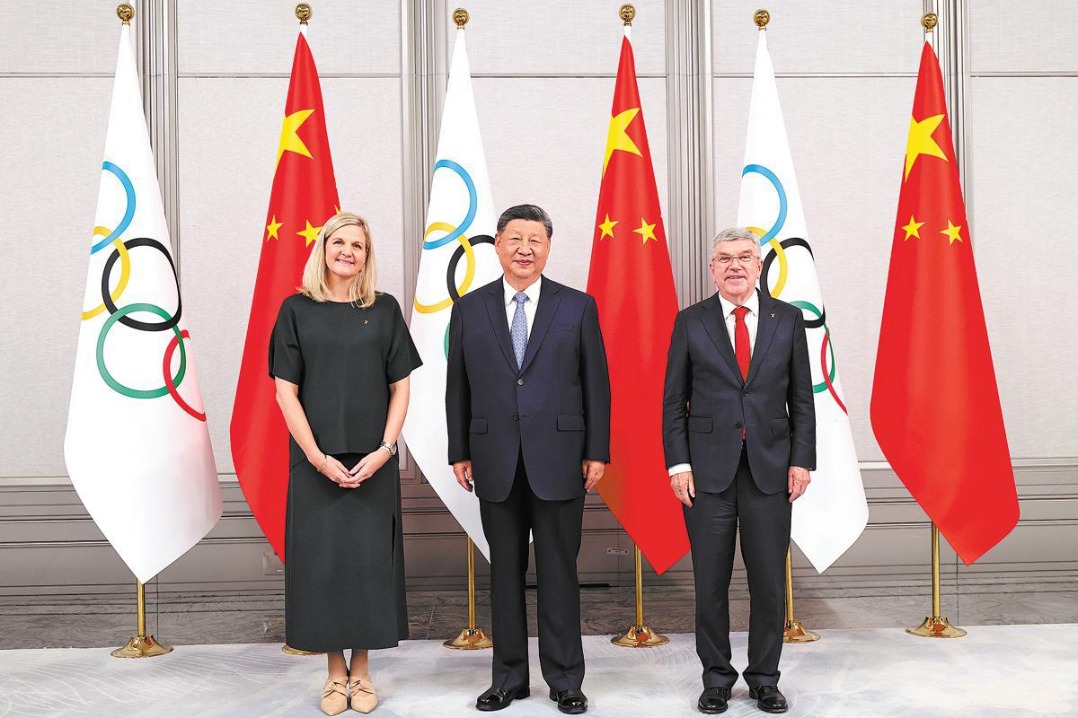Hong Kong's chance to shine at the Games


The electrifying spirit that swept through Hong Kong during the 2024 Paris Olympic Games remains fresh in the city's collective memory. As gold medalist fencers Edgar Cheung Ka-long and Vivian Kong Man-wai made history, the city came alive. Packed shopping malls, lively bars and bustling restaurants celebrated their victories in unison, not only demonstrating a passion for sports but also giving a significant boost to local business.
This unifying power of sports was further showcased with the opening of the Kai Tak Sports Park. The stadium witnessed unprecedented support for the Hong Kong soccer team, with two consecutive full-house attendances of nearly 50,000 spectators. The touching atmosphere was a testament to how athletic endeavors can unite the heart of the city.
These experiences underscore the immense potential of mega sports events to catalyze local economic growth. The benefits extend far beyond the sports industry, positively impacting the retail, hospitality, dining, entertainment, media and technology sectors, while simultaneously promoting a wholesome lifestyle. It is a promising sign for the city's future.
It is for these reasons that the Hong Kong Special Administrative Region government, the sports sector, all stakeholders and the public must unite to ensure the resounding success of the 15th National Games. Being held at Guangdong, Hong Kong and Macao from Nov 9 to 21, the nation's premier sporting event will see over 14,000 athletes from across the country compete in 34 sports across 419 medal events.
Hong Kong will have the honor of hosting eight competition events, including fencing, basketball (men under 22), track cycling, golf, handball (men), rugby sevens, triathlon and beach volleyball. This is expected to bring an estimated 6,000 athletes from the mainland and attract up to 100,000 mainland visitors to Hong Kong.
To maximize this opportunity, the government should reignite the public enthusiasm seen during the Olympics. Promotional arrangements should be redeployed and select government premises, such as sports centers, should provide live broadcasts. Radio Television Hong Kong could dedicate a channel to 24-hour coverage, including live events, highlights and team news.
The power of the media should also be leveraged, with local television and social media platforms delivering extensive live coverage of key competitions round the clock. Meanwhile, major shopping centers should host public viewings, capitalizing on the vibrant atmosphere by launching special sales promotions programs.
This opportunity to cultivate a vibrant home-turf culture should not be missed. Robust public participation, whether in person or through broadcasts, is not just desirable, it's essential for the long-term development of the sports industry. Imagine the powerful statement if the Kai Tak Stadium is opened for free public viewing of the opening ceremony on Nov 9, launching the Games with a spectacular bang.
For the events hosted in Hong Kong, the city's excellence and unique character should be showcased. Taking a cue from spectacles like the US Super Bowl, there could be halftime shows featuring popular stars to create a dynamic fan experience. Venues could also have food and retail bazaars, promoting the local delicacies and culture.
Above all, Hong Kong residents must exemplify the highest standards of civility and sportsmanship. While cheering for home athletes, they should avoid any form of toxic behavior, hostility or verbal abuse toward competitors, both in the stands and online. The true spirit of sportsmanship lies in respecting all athletes. The National Games are an occasion to demonstrate national unity and grace to the world.
Citizens should also be encouraged to travel to Guangzhou, Shenzhen and Macao to watch events such as diving, swimming, table tennis and badminton. It is a perfect opportunity to admire the modern infrastructure of these neighboring cities. Hong Kong travel agencies can also organize tours for international visitors to watch this significant event.
The co-hosting of the 15th National Games is a critical test of collaboration. This model will forge crucial links and provide invaluable insights into the best practices for organizing large-scale events for fostering mutual development. Streamlined cross-boundary travel arrangements for athletes and attendees could set a new standard for future mobility, contributing significantly to the "one-hour living circle" concept within the Greater Bay Area.
A comprehensive review of the cross-city collaboration should be conducted after the Games. A performance review of the athletes will help formulate a development strategy to prepare them for the 2028 Los Angeles Olympics. The Games present a golden opportunity for sports associations to design joint training programs.
The successful co-hosting of the National Games by the Greater Bay Area would powerfully demonstrate the region's capability to mobilize professional expertise. It would substantially bolster the prospect of the Greater Bay Area being selected to host future world-class events, such as the Olympic Games, the FIFA World Cup or the Asian Games. It is time to rise to the occasion and showcase the very best of Hong Kong.
The author is an honorary fellow of HKU Space and HK Metropolitan University. He is an advisor with the Our Hong Kong Foundation and a council member of the Chinese Association of Hong Kong and Macao Studies. The views don't necessarily represent those of China Daily.
If you have a specific expertise, or would like to share your thought about our stories, then send us your writings at opinion@chinadaily.com.cn, and comment@chinadaily.com.cn.

































